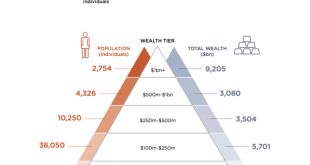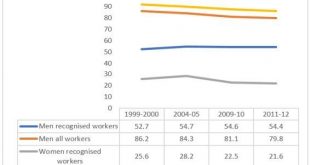from Asad Zaman In the context of the radical Macroeconomics Course I am teaching, I was very unhappy with the material available which tries to explain what Keynes is saying. In attempting to explain it better, I constructed an extremely simple model of a primitive agricultural economy. This model has a lot of pedagogical value in that it can demonstrate many complex phenomenon in very simple terms. In particular, Keynesian, Marxists, Classical and Neo-Classical concepts can be...
Read More »Amazon and Apple: Wall Street’s trillion dollar babies
from Dean Baker Last month Amazon joined Apple, becoming the second company in the world to have a $1 trillion market capitalization. Amazon’s accomplishment didn’t cause quite as much celebration as Apple’s – it pays to be number one – nonetheless this was treated as a milestone that all of us should view as good news. Actually, the celebratory coverage of both events demonstrated the incredibly ill-informed nature of much economic reporting in the United States. A big run-up in share...
Read More »Job Guarantee Programs: careful what you wish for
from Thomas Palley Some progressive economists are now arguing for the idea of a Job Guarantee Program (JGP), and their advocacy has begun to gain political traction. For instance, in the US, Bernie Sanders and some other leading Democrats have recently signaled a willingness to embrace the idea. In a recent research paper I have examined the macroeconomics of such a program. Whereas a JGP would deliver real macroeconomic benefits, it also raises some significant troubling economic and...
Read More »Ten years after
from David Ruccio Everyone, it seems, is writing their version of the lessons to be learned after the crash of 2008. And most of them are getting it wrong. Here, for the record, are some of the lessons I’ve taken from the crash: What has changed—and, equally significant, what hasn’t—during the past decade? Mainstream economists got globalization wrong The policy consensus on economics has not fundamentally changed Mainstream economics has fallen in the eyes of the public—and for good...
Read More »Progressive International Movement
from Yanis Varoufakis Our new international movement will fight rising fascism and globalists Our era will be remembered for the triumphant march of a globally unifying rightwing – a Nationalist International – that sprang out of the cesspool of financialised capitalism. Whether it will also be remembered for a successful humanist challenge to this menace depends on the willingness of progressives in the United States, the European Union, the United Kingdom as well as countries like...
Read More »The housing bubble and financial crisis was easy to see coming
from Dean Baker Ten years ago we saw the culmination of a period of ungodly economic mismanagement with the collapse of Lehman Brothers and a full-fledged financial crisis. The folks who led us into this disaster rushed to do triage and tend to the most important problem: saving the bankrupt banks. They also had to cover their tracks. They insisted that the financial crisis was some sort of fluke event — a lot of bad things went wrong simultaneously — and who could have predicted or...
Read More »Hard-won, self-acquired, self-earned property?!
from David Ruccio Almost 30 thousand people joined the ranks of the global super-rich last year, as booming global stock markets and corporate profits boosted the fortunes of the already very-rich and bumped them up into the ultra-high-net-worth bracket. The global population of ultra-high-net-worth people, classed as those with more than $30 million in assets, increased by 12.9 percent last year to a record 255,810 people, while their combined wealth surged by 16.3 percent to $31.5...
Read More »Structural econometrics
from Lars Syll In the ongoing discussion on the ’empirical revolution’ in economics, some econometricians criticise — rightfully — the view that quasi-experiments and RCTs are the (only) true solutions to finding causal parameters. But — the alternative they put forward, structural models, have their own monumental problems. Structural econometrics — essentially going back to the Cowles programme — more or less takes for granted the possibility of a priori postulating relations that...
Read More »Bernanke, Geithner, and Paulson still don’t have a clue about the housing bubble
from Dean Baker NYT readers were no doubt disturbed to see a column in which former Fed Reserve Board chair Ben Bernanke, Obama Treasury Secretary Timothy Geithner, and Bush Treasury Secretary Henry Paulson patted themselves on the back for their performance in the financial crisis. First, as they acknowledge in the piece, all three completely failed to see the crisis coming. During the years when house prices were getting way out of line with both their long-term trend and rents,...
Read More »Women’s work in India
from Jayati Ghosh One of the difficulties with discussions on employment in India is the tendency to conflate employment and work. But employment is only that part of work that is remunerated, and in India a vast amount of work is actually unpaid and often not even socially recognised. Once we recognise that, a lot of what appears to be inexplicable about Indian employment trends becomes easier to understand. This is especially true of women’s work. There has been much discussion on the...
Read More » Real-World Economics Review
Real-World Economics Review




